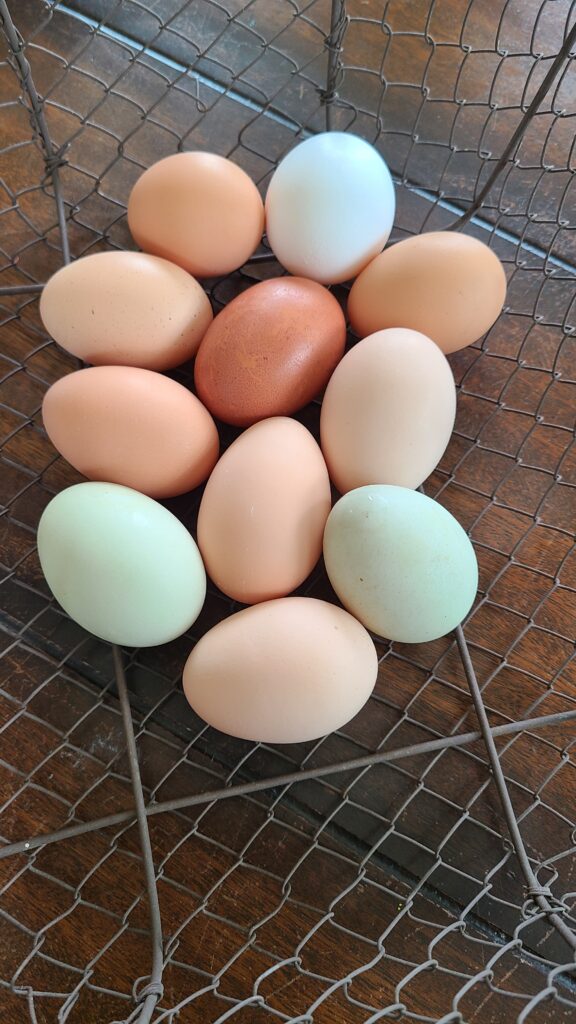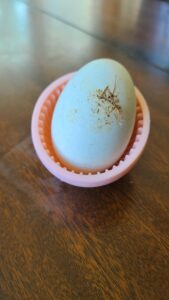The eggs you get from your laying hens need to be handled with care to stay fresh. Here are our recommendations for when and how to wash eggs or leave them “au-naturel.” Decide what is best for your family or farm customers.
This post contains affiliate links. As an Amazon Associate, I earn from qualifying purchases.

Having your own flock of laying hens is great, isn’t it?
I love watching my chickens scratch around the yard, collecting colorful masterpieces every day, and eating delicious farm fresh eggs.
This is how I care for and store my eggs after they leave the coop.
To Wash or Not to Wash?
I prefer my eggs unwashed. However, there are times when washing eggs is necessary.
I only wash the eggs that I collect that are visibly dirty, and here’s why.
When an egg is laid, the hen’s body deposits a protective coating on the outside of the egg called the “bloom.” The bloom is designed to prevent contamination of the egg and moisture loss during the incubation period of the chick (21 days).
By not washing my eggs, they maintain their natural protection and remain fresh, unrefrigerated for three weeks.
In contrast, the dirty eggs (with poop, dirt, or broken egg on them) get washed and refrigerated right away.
So… I sort the eggs when I bring them in and decide whether to wash or not and store them accordingly.
How to Wash Dirty Eggs
I clean my dirty eggs with running water and a soft, silicone scrubber. The one that I have right now (and love!) is made for cleaning make-up brushes. It is just the right size and shape for cleaning eggs. Before I had this, I used a small brush.

There are commercially available egg cleaning solutions that you can purchase. There are also DIY egg cleaning solutions that you can make. I personally don’t bother with these, but just know that they are available.
I don’t recommend using hand or dish soap on eggs because egg shells are permeable and the scent of the soap can be taken up into the egg, altering its flavor.
How to Prevent Dirty Eggs
Keeping your laying boxes clean is the first step in ensuring that your eggs don’t come out of the coop dirty. Changing bedding (straw, pine shavings, etc.) on a regular basis or using washable nesting pads is a good idea and making sure that you have enough roosting space so that the chickens don’t spend the night in the laying boxes helps too.
Collecting eggs daily and culling hens that break and eat eggs are other measures that you can take.
Storing Farm Fresh Eggs
In my house, the unwashed eggs sit out on the countertop in a basket. These eggs stay fresh for 3 weeks. It’s a good idea to mark or separate your eggs, so that you use the oldest ones first.
There are tons of cute egg display stands that you can buy that are functional and also add charm to farmhouse décor.
The eggs that I wash go into cartons and then into the refrigerator. They stay fresh for around 8 weeks. I prefer biodegradable cardboard cartons or reusable plastic egg storage containers.
If you are marketing your eggs, you can order stickers for your cartons or have a custom stamp made and use edible, food-safe ink.
Want to know more about how I care for my flock? Click here to discover 15 features you need to include in your chicken coop/ run!

Mother, farmer, author, and teacher by trade… She loves tending to things and watching them grow!
